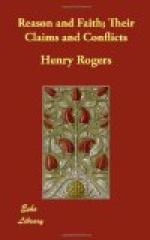and re-adjusted indeed by himself—that
Christianity is a myth, or collection of myths—that
is, a conglomerate (as geologists would say) of a
very slender portion of facts and truth, with an enormous
accretion of undesigned fiction, fable, and superstitions;
gradually framed and insensibly received, like the
mythologies of Greece and Rome, or the ancient systems
of Hindoo theology. It is true, indeed, that
the particular critical arguments, the alleged historic
discrepancies and so forth, on which this author founds
his conclusion—are for the most part, not
original; most of them having been insisted on before,
both in Germany, and especially in our own country
during the Deistical controversies of the preceding
century. His idea of myths, however, may be supposed
original; and he is very welcome to it. For of
all the attempted solutions of the great problem,
this will be hereafter regarded as, perhaps, the most
untenable. Gibbon, in solving the same problem,
and starting in fact from the same axioms,—for
he too endeavoured to account for the intractable
phenomenon—on natural causes alone,—assigned,
as one cause, the reputation of working miracles,
the reality of which he denied; but he was far too
cautious to decide whether the original thunders of
Christianity had pretended to work miracles, and had
been enabled to cheat the world into the belief of
them, or whether the world had been pleased universally
to cheat itself into that belief. He was far
too wise to tie himself to the proof that in the most
enlightened period of the world’s history—amidst
the strongest contrarieties of national and religious
feeling—amidst the bitterest bigotry of
millions in behalf of what was old, and the bitterest
contempt of millions of all that was new—amidst
the opposing forces of ignorance and prejudice on
the one hand and philosophy and scepticism on the
other—amidst all the persecutions which
attested and proved those hostile feelings on the
part of the bulk of mankind—and above all,
in the short space of thirty years (which is all that
Dr. Stauss allows himself),—Christianity
could be thus deposited, like the mythology of Greece
and Rome! These, he knew, were very gradual and
silent formations; originating in the midst of a remote
antiquity and an unhistoric age, during the very infancy
and barbarism of the races which adopted them, confined,
be it remembered, to those races alone; and displaying,
instead of the exquisite and symmetrical beauty of
Christianity, those manifest signs of gradual accretion
which were fairly to be expected; in the varieties
of the deposited or irrupted substances—in
the diffracted appearance of various parts—in
the very weather stains, so to speak, which mark the
whole mass.




